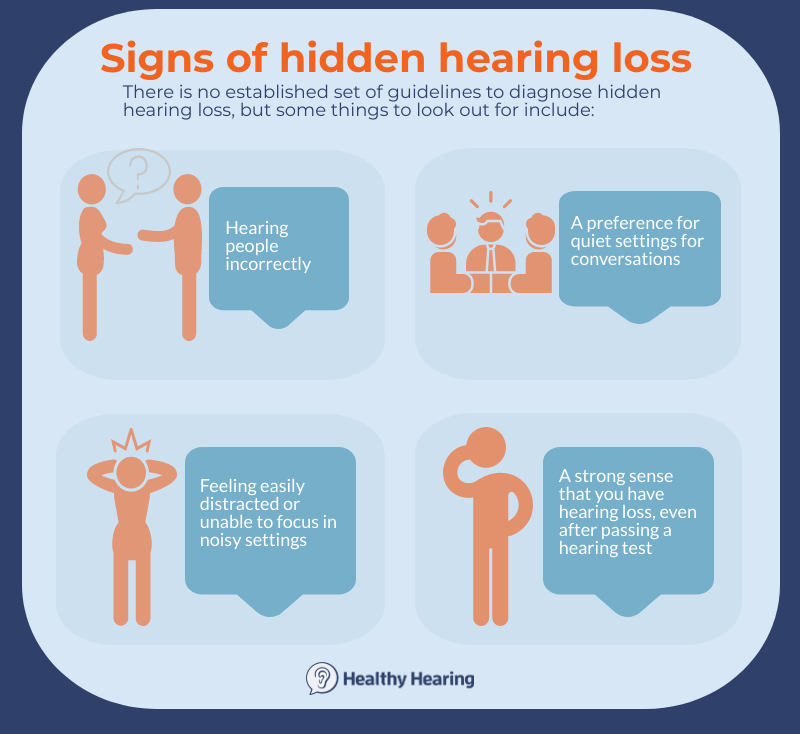|
www.HealthyHearing.com |
'I can hear but not understand'How hearing loss affects speech clarity
Contributed by Joy Victory, managing editor, Healthy Hearing Key points:
What to do about itSchedule an appointment for a hearing test, and make sure it includes speech-in-noise testing. Why: While you might think the problem isn't disruptive enough to warrant a visit to a specialist, it's a common early sign of high-frequency hearing loss. This type of hearing loss makes it harder to hear higher-pitched sounds. "We hear this complaint in our clinics each and every day," said Dr. Julie Prutsman, Au.D, owner and founder of Sound Relief Hearing Center in Fort Collins, Colorado. "Without an understanding of how sound is transferred from the inner ear to the brain, many people are confused by the fact that they can hear sounds, but they cannot always decode all of the sounds properly." Hearing vs. understanding
"When you hear the bass vowel sounds better than you do the high-pitch consonants, it sounds like speech is mumbled or muffled," Prutsman explained. "This is why many patients tell us, 'I can hear, I just can't understand what people are saying all the time, especially if they mumble!'" What's the treatment?
If your test results indicate that you do have some degree of hearing loss, you'll likely get fitted for hearing aids. Hearing aids amplify high-frequency sounds to the necessary volume, making conversations clearer and easier to follow. Beyond hearing aids, a range of assistive listening devices can make it easier to hear or communicate in many different settings. 'The mumblers stopped mumbling!'The good news is that hearing aids are often very effective, Prutsman notes. "Once we correct this high-frequency hearing loss with hearing devices, many patients will tell us, 'The mumblers stopped mumbling!'" she notes. Does it really matter?Yes, even mild hearing loss taxes the brainHearing loss involves not only the ears, but also the brain where sound is translated into meaningful words. When you can't hear well, your brain has to work harder to understand what's being said. This extra effort takes up space in your working memory, leading to listening fatigue.
Besides fatigue, other signs of high-frequency hearing loss include:
Pass a hearing test but still feel like you can't hear?If you've taken a hearing test and were told your hearing is fine, don't give up trying to get answers just yet. Your ears may be fine—but your auditory nerve or your brain may have problems processing sounds or other sensory input. For example: Hidden hearing lossHidden hearing loss is defined as hearing loss that's not detectable on standard hearing tests, which zero in on problems within the ear. Hidden hearing loss is not a problem with the ears—instead, it originates in the brain. Additional testing, such as speech-in-noise testing may be necessary to confirm your diagnosis.
Auditory processing disorders (APD)For some people, hearing but not understanding may signal an auditory processing disorder (APD). This means the nervous system—not the ears—struggles to make sense of the sounds coming in from the ears. APD is often diagnosed in children, but it also can be diagnosed in adults. Attention deficit disorder (ADD)Attention deficit hyperactivity disorder (ADHD) also can make it hard to understand—in the sense that the brain can't quite keep up with all incoming sensory inputs, including and sometimes especially noise. If you have undiagnosed and untreated ADD, you may pass a hearing test just fine, yet feel like you can't understand people, or struggle to follow conversations. In either case, a hearing aid may help a person with APD or ADD focus on the conversation they want to hear most, allowing them to amplify the voice of their preferred speaker (such as a professor). It's worth noting that some kids or adults may have ADD or autism and an auditory processing disorder. Don't accept difficult hearingOnce you begin wearing hearing aids, you will notice improvement with understanding speech and you may even notice you’re hearing sounds that have long been forgotten. For instance, some new hearing aid wearers are pleasantly surprised to hear the soft chirping of songbirds for the first time in years. You will once again be able to hear that beeping sound your microwave makes, your car’s turn signal and your phone ringing. If you can hear, but can’t understand, you’re not alone. This is what hearing care professionals hear almost every day from their patients, and they are highly skilled at getting to the root of the problem, listening to your concerns and finding a solution that meets your needs. Don’t give up on enjoying conversations at work, home and play. Find a hearing center near you with our directory, and make the call today. Joy Victory, managing editor, Healthy Hearing
|
Featured clinics near me
Earzlink Hearing Care - Reynoldsburg
7668 Slate Ridge Blvd
Reynoldsburg, OH 43068

Find a clinic
Need a hearing test but not sure which clinic to choose?
Call 1-877-872-7165 for help setting up a hearing test appointment.


.jpg)

 Joy Victory has extensive experience editing consumer health information. Her training in particular has focused on how to best communicate evidence-based medical guidelines and clinical trial results to the public. She strives to make health content accurate, accessible and engaging to the public.
Joy Victory has extensive experience editing consumer health information. Her training in particular has focused on how to best communicate evidence-based medical guidelines and clinical trial results to the public. She strives to make health content accurate, accessible and engaging to the public.